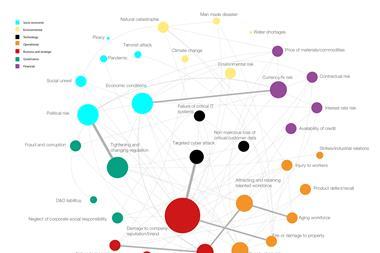Good data and trust are the cornerstones to successful co-creation, according to panellists at Airmic Fest.
Wednesday 23 September 2020
11:30: Session: Collaboration is key to build insurance products fit for the businesses of the future
Co-creation and innovative risk financing are on the rise, according to a panel speaking at the virtual Airmic Fest conference today.
Speakers highlighted case studies of successful co-creation including insurance solutions for a bike-hire company in Turin, baggage claims handling for airports and helping life sciences companies move more quickly.
All the panellists detailed how the rise of innovative new businesses means that typical ‘off the shelf’ insurance products are no longer suitable and instead new bespoke insurance solutions are needed.
However, this is far from straightforward, particularly since many of the organisations in question are entrepreneurial meaning the products and services they create have never existed before. This makes risk transfer tricky, since there is no obvious loss history.
To counter this, insurers and businesses must work ever closer together, sharing data and information to help underwriters better understand potential losses. And all of this must be done rapidly, as businesses often need insurance for regulatory purposes.
Ailsa King, chief client officer, Marsh UK & Ireland said: “The pace of the transaction is accelerating and because these types of businesses work very quickly and they are adapting all the time to new markets - they expect brokers and insurers to act at a similar pace.
“It takes a lot of actuarial resource in our teams dedicated to looking at the data sets that companies like this have. Often it means looking at their customer service data, the payments they’ve been making over the last month to avoid claims and to avoid lawsuits. That data effectively can be put together with actuaries pulling together all that mass data points that we have to give a view of a loss history.”
Of course, for this process to work, businesses need to trust their insurers and brokers and be willing to provide them with the data that they need. Because if businesses don’t trust the markets and work with them collaboratively then the insurance industry cannot co-create the products required or understand how the exposures are changing.
Sean McGovern, CEO, UK & Lloyd’s market at AXA XL detailed some of the challenges that his organisation faced when trying to launch a digital risk engineer product. He explained: “The initial issue that we faced as we were talking to clients was trust. How we going to build client trust around what we were going to use the data for.
“I guess we can draw an analogy from when insurers first came up with the idea of putting black boxes in people’s cars. There was a lot of resistance there was a lot of speculation and suspicion about what insurers would actually use that data for, but now millions of these boxes are in people’s cars without them even thinking about it.
“So we had to find a client who really wanted to explore with us the potential benefits to them both from a risk prevention point of view but also ways in which actually could help them improve operational efficiencies.”
Such data sharing is a two-way street and insurers in turn need to be more transparent and quick to share loss information with their clients. Matthew Wilson, president & chief executive officer at Travelers Europe, pointed to the example of Elon Musk selling car insurance.
He argued that the reason Musk launched this was not because he wanted to be in the insurance business, but rather because he needed the loss data quickly to improve the cars he makes and inform the next generation of products. He added: “I think what insurance companies have to remember is that data has so much more value than just leading to their own insurance products.”
All this is complicated but for those companies and insurers that can work collaboratively together, the result can be a new sort of risk transfer that suits everyone.
Claire McDonald, managing director, HDI Global UK concluded: “It’s about building trusted relationships and listening properly to what the other party is seeking to achieve. At the end of the day we all want a win-win outcome, we want our clients to be successful in their industries and so we need to be listening properly, bringing a diverse set of thoughts and experiences into the room… and you gradually get to a point where you can actually build a product that everybody’s happy with.”
In partnership with






















No comments yet